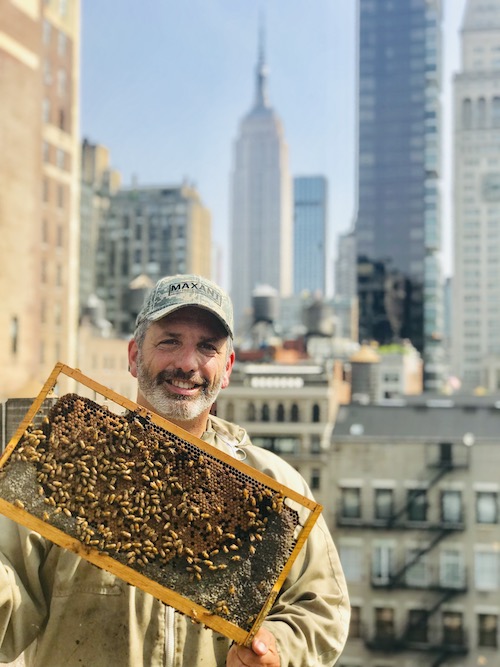
Andrew Coté. Photos by Paulo Anjou.
By Angela Barbuti
If you’ve ever seen a truck colorfully decorated with an image of a bee against the Manhattan skyline, then you may already be familiar with the work of our neighbor Andrew Coté. The fourth-generation beekeeper is responsible for the upkeep of 104 beehives in the five boroughs. On a typical workday, he can be found tending to bees across the city, atop landmarks like the Brooks Brothers’ flagship store and the Waldorf Astoria, and on the grounds of the United Nations and Bryant Park. A resident of the Upper West Side for close to a decade, he maintains four apiaries in the area, on 61st Street and Broadway, 59th Street near Columbus Circle, 68th Street and Central Park West, and 91st Street and Central Park West.
“The bees are busy going about the work of pollinating the Big Apple and making caramelized sunshine for me to bottle and sell,” said the Connecticut native, who proudly peddles his wares at the Union Square Greenmarket. The honey produced in his hives are labeled based on the areas in which it was procured. If it was garnered on the Upper West Side, for example, you would see the words “Central Park,” scrawled on that jar. When asked if those bees actually get their nectar from the park, Coté affirmed, “I am certain that the Central Park honey is foraged from the nearly thousand acres of nectar buffet from Central Park. The colonies are half a block away and make beelines for the park as soon as the sun comes up.”
This past summer, the honey farmer was a busier bee than usual, with the release of his memoir, “Honey and Venom: Confessions of an Urban Beekeeper.” The book is full of stories about what beekeeping is like in our city, including the fact that it was made illegal during the Giuliani administration. When Coté founded the New York City Beekeepers Association in 2007, part of his work included petitioning to legalize it. “There were a lot of groups and people who were involved, but I was the beekeeper that the Department of Health called in to their meetings,” he explained.
In 2010, the Department of Health and Mental Hygiene made beekeeping legal here, and in fact, Coté wrote the best practices guide provided on the DOHMH’s website. As a result, he became the department’s go-to consultant when it comes to bee concerns, including swarms that can form in the unlikeliest of places. “From swarms, to feral colonies within walls, to beehives that are not registered, but are on a fire escape or roof without permission,” he said of the predicaments he’s faced. In the book, he details the many precarious spots in which swarms have settled- a hot dog cart in Times Square, the side-view mirror of a car parked along the West Side Highway, and a fence on the deck of the USS Intrepid.
Coté also shares his over-40 years of knowledge on the fascinating insects that, he notes, have five eyes, four wings, and two stomachs, by teaching beekeeping classes. The buzzworthy sessions, which are sponsored by the Beekeepers Association, are highly sought after and always filled to their maximum capacities. Before the pandemic halted his instruction, they were held at the New York Institute of Technology on Broadway and 61st Street. As for when they will resume, he said, “We are hoping to do virtual classes in February and depending on what happens in the spring, perhaps hands-on classes again in April.”
In July, he appeared in an episode of “Down to Earth,” the new environmental Netflix docuseries hosted by Zac Efron. The segment was filmed on the rooftop of the Hilton New York Midtown, which is inhabited by 450,000 bees. Coté educates viewers with staggering statistics like the fact that there are more honeybees in New York City than there are people and urban honey contains less chemicals because cities don’t get sprayed as much with pesticides.
When he is not harvesting honey, assisting with swarms, teaching classes, or on television, Coté dedicates time to his nonprofit, Bees without Borders. He launched the 501c3 with his father, who taught him the trade, with a mission to help alleviate poverty through beekeeping. “We work with beekeepers in underserved areas of Brooklyn, in Haiti, Republic of Moldova, Fiji, and beyond,” he said.
As for his truck, which is oftentimes parked on 72nd Street, Coté said it generates buzz in the neighborhood. “It is out of place on the Upper West Side, but perhaps so am I,” he quipped. While an overwhelming majority are delighted by and curious about the truck, taking photos and posting on social media, others are not too fond of what they, mistakenly, consider a commercial vehicle.
“They come up to me and tell me, ‘You can’t have a commercial truck parked on the street,’” he said. “And the truth is, even though it may appear to be, it is not a commercial truck. It has agricultural plates. It is completely legal for me to park it there.” The dissenters go so far as to leave negative notes on his truck or through his website. But Coté has the solution to their unhappiness. “If these people have a real problem with it, then they’re just a little too sour and just need more honey in their lives.”
As for his future plans, Coté, who, very fittingly, met his wife while selling honey at the Rockefeller Center Greenmarket, hopes to one day join the GreenFlea market at 77th and Columbus. “That would be a dream come true for me,” the father of two said. “As being part of the neighborhood, it would be really nice to sell there because I know the families now.”



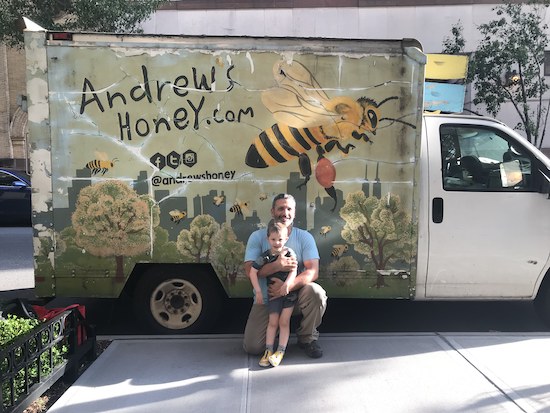

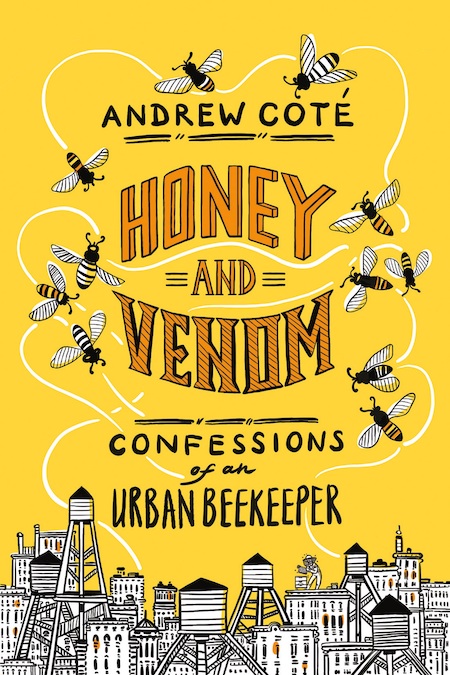
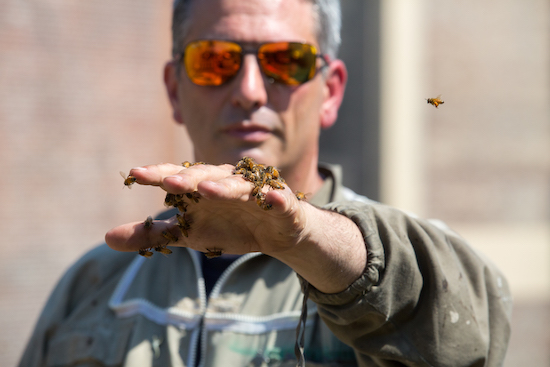

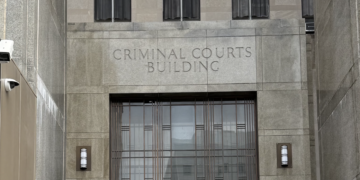
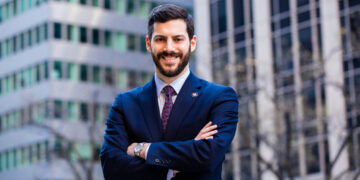

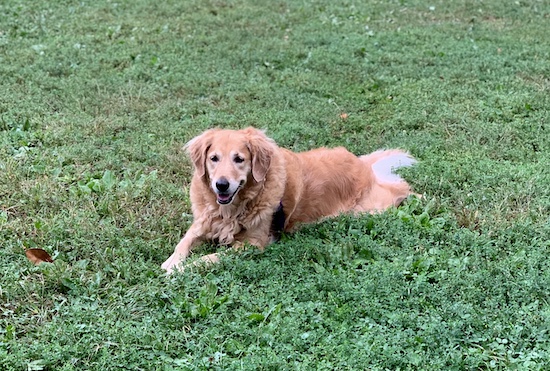
I need to create a buzz about his whipped honey, it’s to die for!
Yes,PLEASE sell at the 77th St Greenmarket!!
you’d BEE a celebrity 🐝
What a sweet guy. This is the kind of professional diversity we need in the neighborhood! Don’t know how you get a spot at a greenmarket, but I know he’d be popular at the 77th st greenmarket.
I’d certainly buy if he sells at the 77th Street greenmarket.
It would be great to see you at the UWS GreenFlea when it reopens. Support local.
What a great story and great human being.Can’t wait to taste his honey and buy his book.
I looked at Andrew’s website and none of his products are sold on the UWS. How about giving the neighborhood an opportunity to support you?
His honey is incredibly expensive. That may be why he sells at other locations, not UWS.
LOVE Andrew’s Honey! let’s put native plant gardens on all rooftops in NYC to support pollinators of all types!
This is when I’m bummed to be allergic to honey. I imagine it would be quite fun to do side-by-side tastes of the varieties. But as for pesticides, the people I know who have bees (outside NY) don’t use them. But I joke that I grew up eating organic, we just didn’t call it that. We didn’t call it DIY, either, but I guess it was that, too. I think it was just the knowledge that if you didn’t have a garden and a gun, you didn’t have enough to eat. Are the bees now sort of back to what some of the old co-op-ish buildings would do in terms of growing food for residents? Maybe I’m mixing my hybrids? Cool bees!
Sweet!
Is there anyplace I can purchase the honey on the UWS?
Are you at the Union Square farmers mkt all days they are open or just select days?
How cool!
We grow flowers on our 21st floor balcony just a few blocks away from these UWS hives. So, it is possible that some of the honey bees visiting our flowers may come from there (contact tracing, please?). Do I get a discount for being in the supply chain? But I must say that the majority of pollinators visiting us are not honey bees but bumble bees, sweat bees and syrphid flies.
He’s at the 96th st green market. I saw hm 2 weeks ago!
Go to the website, you can order his products online and have them delivered right to your door on the UWS. The honey doesnt look to be any more expensive than local stores. Yes, the Central Park/NYC honey is more expensive, imagine it requires more labor to collect and sort honey by neighborhood than it does to bottle a commercial product like Wildflower Honey. But hey, its New York, you have to pay for the best!
Andrew,
Do you know why there are many bees around Ellington Cafe in Riverside Park and 103 St?
Is it just because there is food? Are there any trees that attract bees there? Thanks.
Blonde
Where can we buy his honey?
I bought — yes, expensive — Apricot Whipped Honey from Andrew at the 97th St. Greenmarket.
But he said he was only there that once, for Rosh Hashana.
I can’t resist extra sweetness in my life in this sour season.
We love the bees that surprise us by visitBig our little pots of balcony flowers even hundreds of feet Above the street. (Pesticide free!) And I like eating Andrew’s honey. Great story, thanks. (Also love this covid safe, pandemic secure business – we need every one!)
Wonderful
Love it!!!
CNN featured him in a documentary years ago.Very interesting guy. https://vimeo.com/cnnthenextlist
This is why I love this site. I have always enjoyed seeing his truck and wondered if he was just related to the farmers market. I am in love with this story…and happy to say quite sure his bees have been visiting my flowers, which are close to one of his hives!